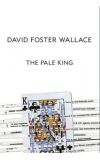
15 Apr 2011 03:23:37
Most of the world's information, Wallace shows us over and over in "The Pale King", is not really worth knowing. Wallace was still writing "The Pale King" when he killed himself in 2008, leaving an unanswered question for both his many devoted readers and, apparently, himself: How does one live a meaningful life when so much of what surrounds us all seems so meaningless?
"The Pale King" doesn't really hold together as a novel, with no conventional resolution and plenty of characters and tangents seemingly unconnected to the book's main action. It's a fact that Wallace's longtime editor acknowledges in a necessary foreword detailing how he, at the request of Wallace's widow, assembled this 547-page book from hundreds and hundreds of pages of writing the acclaimed writer left behind.
"There is no question that 'The Pale King' would have been vastly different had he survived to finish it," wrote Michael Pietsch, who was also Wallace's editor on his 1996 epic, "Infinite Jest."
That "The Pale King" is not a final product, though, in no way subtracts from the strange and memorable pleasures on every page of this book. What will seem like a gift to Wallace's many fans should earn him many new ones as well — readers willing to be challenged by his dense and brilliant prose, impressed by the endless reach of his perception and charmed by his offbeat humor.
Even Wallace's previous, finished novels placed little emphasis on plot or payoff, and Pietsch writes in his foreword that Wallace in his notes envisioned the book as "a series of setups for things to happen but nothing ever happens." The action in the book centers mostly on an IRS processing center in Peoria, Ill., in the mid-1980s. There are suggestions of a looming power struggle between competing management factions, but that never really comes into focus. What might have gelled in a finished novel becomes instead a patchwork of lively character sketches frequently punctuated by Wallace's lengthy digressions into politics, economics and tax policy, urban planning and traffic patterns, and particularly the inanities and ineptitudes of large bureaucracies.

